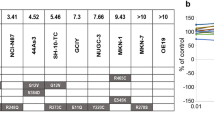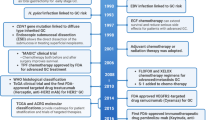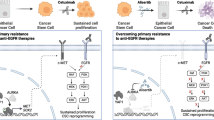Abstract
Colorectal cancer (CRC) is a heterogeneous disease with a broad spectrum of genetic and epigenetic changes. A comprehensive molecular characterization of CRC by The Cancer Genome Atlas Network detected the overexpression of the insulin-like growth factor 2 (IGF2) gene, encoding a ligand for the insulin-like growth factor 1 receptor (IGF-1R), in a subset of CRC tumors. In this study, we investigated the oncogenic potential of IGF-2 in IGF2-overexpressing CRC models and the efficacy of MEDI-573, an IGF-1/2-neutralizing antibody. We found that a subset of CRC cell lines express high IGF-2 levels owing to an increased DNA copy number and hypermethylation in the H19 promoter of the IGF2 gene. MEDI-573 efficiently neutralized IGF-2 and induced apoptosis, which resulted in significant tumor growth inhibition in CRC mouse models that express high levels of IGF-2. These effects were specific to CRCs overexpressing IGF-2, as MEDI-573 did not affect the growth CRC cell lines with normal levels. Moreover, blockade of IGF-2 by MEDI-573 modulated other signaling pathways, suggesting combination therapies with inhibitors of these pathways. Indeed, in vivo efficacy was significantly enhanced when MEDI-573 was used in combination with trastuzumab, AZD2014 (dual mTORC1/2i), AZD5363 (AKTi) and selumetinib (AZD6244/ARRY-142886, MEK1/2i) or cetuximab. These results demonstrate that overexpressed IGF-2 is the major tumorigenic driver in a subset of CRCs and encourage testing of MEDI-573, alone and in combinations, in IGF2-overexpressing CRC patients.
This is a preview of subscription content, access via your institution
Access options
Subscribe to this journal
Receive 50 print issues and online access
$259.00 per year
only $5.18 per issue
Buy this article
- Purchase on Springer Link
- Instant access to full article PDF
Prices may be subject to local taxes which are calculated during checkout





Similar content being viewed by others
References
Siegel R, Ma J, Zou Z, Jemal A . Colorectal cancer statistics. 2014. CA Cancer J Clin 2014; 64: 104–117.
Saltz LB, Meropol NJ, Loehrer Sr PJ, Needle MN, Kopit J, Mayer RJ . Phase II trial of cetuximab in patients with refractory colorectal cancer that expresses the epidermal growth factor receptor. J Clin Oncol 2004; 22: 1201–1208.
Van Cutsem E, Peeters M, Siena S, Humblet Y, Hendlesz A, Neyns B et al. Open-label phase III trial of panitumumab plus best supportive care compared with best supportive care alone in patients with chemotherapy-refractory metastatic colorectal cancer. J Clin Oncol 2007; 25: 1658–1664.
Fearon ER . Molecular genetics of colorectal cancer. Ann Rev Pathol 2011; 6: 467–507.
The Cancer Genome Atlas Network. Comprehensive molecular characterization of human colon and rectal cancer. Nature 2012; 487: 330–337.
Seshagiri S, Stawiski EW, Durinck S, Modrusan Z, Storm EE, Conboy CB et al. Recurrent R-spondin fusions in colon cancer. Nature 2012; 488: 660–667.
Sciacca L, Costantino A, Pandini G, Mineo R, Frasca F, Scalia P et al. Insulin receptor activation by IGF-II in breast cancers: evidence for a new autocrine/paracrine mechanism. Oncogene 1999; 18: 2471–2479.
Belfiore A, Frasca F, Pandini G, Sciacca L, Vigneri R . Insulin receptor isoforms and insulin receptor/insulin-like growh factor receptor hybrids in physiology and disease. Endocr Rev 2009; 30: 586–623.
Sachdev D, Yee D . Disrupting insulin-like growth factor signaling as a potential cancer therapy. Mol Cancer Ther 2007; 6: 1–12.
Yuen JS, Macaulay VM . Targeting the type 1 insulin-like growth factor receptor as a treatment for cancer. Expert Opin Ther Targets 2008; 12: 589–603.
Baserga R . The insulin-like growth factor-I receptor as a target for cancer therapy. Expert Opin Ther Targets 2005; 9: 753–768.
Wang Y, Hailey J, Williams D, Wang Y, Lipari P, Malkowski M et al. Inhibition of insulin-like growth factor I receptor (IGF-IR) signaling and tumor cell growth by a fully human neutralizing anti-IGF-IR antibody. Mol Cancer Ther 2005; 4: 1214–1221.
Fidler MJ, Shersher DD, Borgia JA, Bonomi P . Targeting the insulin-like growth factor receptor pathway in lung cancer: problems and pitfalls. Ther Adv Med Oncol 2012; 4: 51–60.
Weroha SJ, Haluska P . IGF-1 receptor inhibitors in clinical trials – early lessons. J Mammary Gland Biol Neoplasia 2008; 13: 471–483.
Gualberto A, Pollak M . Clinical development of inhibitors of the insulin-like growth factor receptor in oncology. Curr Drug Targets 2009; 10: 923–936.
Gao J, Chesebrough JW, Cartlidge SA, Ricketts S, Incognito L, Veldman-Jones M et al. Dual IGF-I/II-neutralizing antibody MEDI-573 potently inhibits IGF signaling and tumor growth. Cancer Res 2011; 71: 1029–1041.
Zhong H, Fazenbaker C, Breen S, Chen C, Huang J, Morehouse C et al. MEDI-573, alone or in combination with mammalian target of rapamycin inhibitors, targets the insulin-like growth factor pathway in sarcomas. Mol Cancer Ther 2014; 13: 2262–2273.
Haluska P, Menefee M, Plimack ER, Rosenberg J, Northfelt D, LaVallee T et al. Phase I dose-escalation study of MEDI-573, a bispecific, antiligand monoclonal antibody against IGFI and IGFII, in patients with advanced solid tumors. Clin Cancer Res 2014; 20: 4747–4757.
Cui H, Horon IL, Ohlsson R, Hamilton SR, Feinberg AP . Loss of imprinting in normal tissue of colorectal cancer patients with microsatellite instability. Nat Med 1998; 4: 1276–1280.
Nakagawa H, Chadwick RB, Peltomaki P, Plass C, Nakamura Y, Chapelle A . Loss of imprinting of the insulin-like growth factor II gene occurs by biallelic methylation in a core region of H19-associated CTCF-binding sites in colorectal cancer. PNAS 2001; 98: 591–596.
Cui H, Cruz-Correa M, Giadiello FM, Hutcheon DF, Kafonek DR, Brandenburg S et al. Loss of IGF-2 imprinting: a potential marker of colorectal cancer risk. Science 2003; 299: 1753–1755.
Zhao R, Cruz-Correa M . Loss of imprinting of the insulin-like growth factor 2 gene and risk of colorectal cancer. Curr Colorectal Cancer Rep 2008; 4: 65–70.
Cheng Y-W, Idrees K, Shattock R, Khan SA, Zeng Z, Brennan CW et al. Loss of imprinting and marked gene elevation are two forms of aberrant IGF2 expression in colorectal cancer. Int J Cancer 2010; 127: 568–577.
Morgillo F, Woo JK, Kim ES, Hong WK, Lee HY . Heterodimerization of insulin-like growth factor receptor/epidermal growth factor receptor and induction of survivin expression counteract the antitumor action of erlotinib. Cancer Res 2006; 66: 10100–10111.
Shin DH, Min HY, El-Naggar AK, Lippman SM, Glisson B, Lee HY . Akt/mTOR counteract the antitumor activities of cixutumumab, and anti-insulin-like growth factor I receptor monoclonal antibody. Mol Cancer Ther 2011; 10: 2437–2448.
Huang F, Greer A, Hurlburt W, Han X, Hafezi R, Wittenberg GM et al. The mechanisms of differential sensitivity to an insulin-like-growth factor-1 receptor inhibitor (BMS-536924) and rationale for combining with EGFR/HER2 inhibitors. Cancer Res 2009; 69: 161–170.
Guichard SM, Curwen J, Bihani T, D'Cruz CM, Yates JW, Grondine M et al, AZD2014, an inhibitor of mTORC1 and mTORC2, is highly effective in ER+ breast cancer when administered using intermittent or continuous schedules. Mol Cancer Ther 2015; 14: 2508–2518.
Davies BR, Greenwood H, Dudley P, Crafter C, Yu D, Zhang J et al. Preclinical pharmacology of AZD5363, an inhibitor of AKT: pharmacodynamics, antitumor activity, and correlation of monotherapy activity with genetic background. Mol Cancer Ther 2012; 11: 873–887.
Davies BR, Logie A, McKay JS, Marin P, Steele S, Jenkins R et al. AZD6244 (ARRY-142886), a potent inhibitor of mitogenactivated protein kinase/extracellular signal-regulated kinase kinase 1/2 kinases: mechanism of action in vivo, pharmacokinetic/pharmacodynamic relationship, and potential for combination in preclinical models. Mol Cancer Ther 2007; 6: 2209–2219.
Zanella ER, Galimi F, Sassi F, Migliardi G, Cottino F, Leto SM et al. IGF-2 is an actionable target that identifies a distinct subpopulation of colorectal cancer patients with marginal response to anti-EGFR therapies. Sci Transl Med 2015; 7: 272ra12.
Ravenel JD, Broman KW, Perlman EJ, Niemitz EL, Jayawardena TM, Bell DW et al. Loss of imprinting of insulin-like growth factor-II (IGF2) gene in distinguishing specific biologic subtypes of Wilms tumor. J Natl Cancer Inst 2001; 93: 1698–1703.
Giovannucci E . Insulin, insulin-like growth factors and colon cancer: a review of the evidence. J Nutr 2001; 131: 3109S–3120S.
Lahm H, Suardet L, Laurent PL, Fischer JR, Ceyhan A, Givel JC et al. Growth regulation and co-stimulation of human colorectal cancer cell lines by insulin-like growth factor I, II and transforming growth factor alpha. Br J Cancer 1992; 65: 341–346.
Remacle-Bonnet M, Garrouste F, el Atiq F, Roccabianca M, Marvaldi J, Pommier G . des-(1-3)-IGF-I, an insulin-like growth factor analog used to mimic a potential IGF-II autocrine loop, promotes the differentiation of human colon carcinoma cells. Int J Cancer 1992; 52: 910–917.
Lahm H, Amstad P, Wyniger J, Yilmaz A, Fischer JR, Schreyer M et al. Blockade of the insulin-like growth-factor-1 receptor inhibits growth of human colorectal cancer cells: evidence of a functional IGF-II-mediated autocrine loop. Int J Cancer 1994; 58: 452–459.
Shiratsuchi I, Akagi Y, Kawahara A, Kinugasa T, Romeo K, Yshida T et al. Expression of IGF-1 and IGF-1R and their relation to clinicopathological factors in colorectal cancer. Anticancer Res 2011; 31: 2541–2546.
Ma J, Pollak MN, Giovannucci E, Chan JM, Tao Y, Hennekens CH et al. Prospective study of colorectal cancer risk in men and plasma levels of insulin-like growth factor (IGF)-I and IGF-binding protein-3. J Natl Cancer Inst 1999; 91: 620–625.
Zhang H, Berezov A, Wang Q, Zhang G, Drebin J, Murali R et al. ErbB receptors: from oncogenes to targeted cancer therapies. J Clin Invest 2007; 117: 2051–2058.
Ghosh JC, Dohi T, Kang BH, Altieri DC . Hsp60 regulation of tumor cell apoptosis. J Biol Chem 2008; 283: 5188–5194.
Faubert B, Vincent EE, Poffenberger MC, Jones RG . The AMP-activated protein kinase (AMPK) and cancer: Many faces of a metabolic regulator. Cancer Lett 2015; 356: 165–170.
Gazdar AF . Activating and resistance mutations of EGFR in non-small-cell lung cancer: role in clinical response to EGFR tyrosine kinase inhibitors. Oncogene 2009; 28: S24–S31.
Misale S, Di Nicolantonio F, Sartore-Bianchi A, Siena S, Bardelli A . Resistance to anti-EGFR therapy in colorectal cancer: from heterogeneity to convergent evolution. Cancer Discov 2014; 4: 1269–1280.
Tran TN, Selinger CI, Yu B, Ng CC, Kohonen-Corish MRJ, McCaughan B et al. Alterations of insulin-like growth factor-1 receptor gene copy number and protein expression are common in non-small cell lung cancer. J Clin Pathol 2014; 67: 985–991.
Abraham J, Prajapati SI, Nishijo K, Schaffer BS, Taniguchi E, Kilcoyne A et al. Evasion mechanisms to Igf1r inhibition in rhabdomyosarcoma. Mol Cancer Ther 2011; 10: 697–707.
Mazzoletti M, Bortolin F, Brunelli L, Pastorelli R, Giandomenico SD, Erba E et al. Combination of PI3K/mTOR inhibitors: antitumor activity and molecular correlates. Cancer Res 2011; 71: 4573–4584.
Ou D, Lee B, Lin L, Liou J, Liao S, Hsu C et al. Vertical blockade of the IGFR-PI3K/Akt/mTOR pathway for the treatment of hepatocellular carcinoma: the role of survivin. Mol Cancer 2014; 13: 2.
Renehan AG, Zwahlen M, Minder C, O'Dwyer ST, Shalet SM, Egger M . Insulin-like growth factor (IGF)-1, IGF binding protein-3, and cancer risk: systematic review and meta-regression analysis. Lancet 2004; 363: 1346–1353.
Acknowledgements
We thank Mohammed Dar, Parthiv Mahadevia, Dirk Mendel, Robert Sikorski, Teresa Klinowska, Sabina Cosulich, Barry Davies and Stephen Green for scientific input and manuscript review. This work was supported by MedImmune.
Author information
Authors and Affiliations
Corresponding author
Ethics declarations
Competing interests
The authors are full-time employees of MedImmune.
Additional information
Supplementary Information accompanies this paper on the Oncogene website
Supplementary information
Rights and permissions
About this article
Cite this article
Zhong, H., Fazenbaker, C., Chen, C. et al. Overproduction of IGF-2 drives a subset of colorectal cancer cells, which specifically respond to an anti-IGF therapeutic antibody and combination therapies. Oncogene 36, 797–806 (2017). https://doi.org/10.1038/onc.2016.248
Received:
Revised:
Accepted:
Published:
Issue Date:
DOI: https://doi.org/10.1038/onc.2016.248
This article is cited by
-
Insulin receptor alternative splicing in breast and prostate cancer
Cancer Cell International (2024)
-
IGF2BP3 promotes the progression of colorectal cancer and mediates cetuximab resistance by stabilizing EGFR mRNA in an m6A-dependent manner
Cell Death & Disease (2023)
-
The drug-induced phenotypic landscape of colorectal cancer organoids
Nature Communications (2022)
-
β-catenin/TCF activity regulates IGF-1R tyrosine kinase inhibitor sensitivity in colon cancer
Oncogene (2018)
-
Insulin-Like Growth Factor (IGF) Pathway Targeting in Cancer: Role of the IGF Axis and Opportunities for Future Combination Studies
Targeted Oncology (2017)



